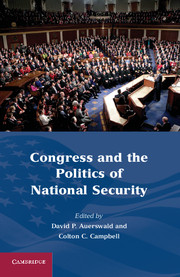Book contents
- Frontmatter
- Contents
- Figures and Tables
- Contributors
- Part One Historical and Institutional Challenges
- Part Two Oversight Challenges
- 4 Congress and Defense
- 5 Congress and Homeland Security
- 6 Congress and Intelligence
- 7 Foreign Aid Oversight Challenges for Congress
- Part Three Policy Challenges: Contours of Debate
- Works Cited
- Index
- References
6 - Congress and Intelligence
from Part Two - Oversight Challenges
Published online by Cambridge University Press: 05 June 2012
- Frontmatter
- Contents
- Figures and Tables
- Contributors
- Part One Historical and Institutional Challenges
- Part Two Oversight Challenges
- 4 Congress and Defense
- 5 Congress and Homeland Security
- 6 Congress and Intelligence
- 7 Foreign Aid Oversight Challenges for Congress
- Part Three Policy Challenges: Contours of Debate
- Works Cited
- Index
- References
Summary
Sixteen federal intelligence agencies comprise America’s Intelligence Community – a vital first line of defense to protect the nation against terrorists and other threats (Johnson 2011a). Yet, in the manner of other government organizations, they can fall prey to Lord Acton’s well-known prophecy that “power tends to corrupts and absolute power corrupts absolutely.” History reveals that time and again a nation’s secret services have turned their disquieting capabilities for the surveillance and manipulation of enemies against the very citizens they were meant to shield. Efforts by lawmakers in Congress to maintain accountability over intelligence agencies (“oversight,” in the awkward expression of American political scientists) has proven difficult and has often failed.
The thesis that secret government organizations can be a danger to open societies should hardly astound. After all, intelligence agencies are made up of human beings, flawed by nature; consequently, one can anticipate intelligence failures and abuses. No mere mortal is omniscient, nor can any human lay claim to Kantian purity in government affairs. Yet societies seem regularly taken aback by the occurrence of intelligence failures and scandals. They express amazement and dismay that espionage services have been unable to provide a clairvoyant warning of impending danger; or that they have spied or plotted against citizens at home, not just adversaries abroad. In contrast to this naivety, the American founder James Madison understood that nations were led not by angels but by mere mortals; failure and scandal were inevitable.
- Type
- Chapter
- Information
- Congress and the Politics of National Security , pp. 121 - 143Publisher: Cambridge University PressPrint publication year: 2011
References
- 1
- Cited by



